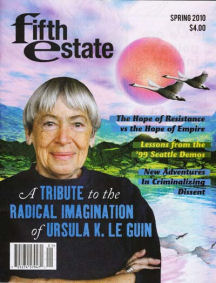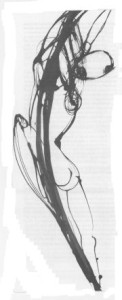Fifth Estate 382, Spring, 2010 Add to the Bookbuilder

Fifth Estate Collective
Contents of print edition
Theme: A tribute to the radical imagination of Ursula K. Le Guin
“We are going to inherit the earth. There is not the slightest doubt about that. The bourgeoisie may blast and burn its own world before it finally leaves the stage of history. We are not afraid of ruins. We who ploughed the prairies and built the cities can build again, only better next time. We carry a new world, here in our hearts. That world is growing this minute.”
-- Durruti
Mar 23, 2014 Read the whole text...
Fifth Estate Collective
Editorial: True Voyage Is Return
By the time you hold this issue in your hands, Fifth Estate will have entered into its 45th year of continuous publication! This is no small feat for an all-volunteer run publication operating on a shoestring budget, and it would not be possible without the continued support of our subscribers, sustainers, and readers like you. For this, you have the heartfelt thanks of everyone in the FE collective. That said, if you are not yet a subscriber, please consider subscribing so we can continue to bring you compelling stories and well argued essays from FE’s unique perspectives (see our subscription call out on page 37). If you are already a subscriber, consider donating or sponsoring a subscription to a prisoner (FE provides free subscriptions to prisoners).
Mar 23, 2014 Read the whole text...
Various Authors
Letters
Our readers respond
Send letters to fe — at — fifthestate — dot — org or Fifth Estate, POB 201016, Ferndale, MI 48220
All formats accepted including typescript & handwritten; letters may be edited for length.
Spencer Sunshine’s review of John Zerzan’s Twilight of the Machines begins promisingly enough with a brief summation of Zerzan’s history and a lengthy description of Twilight’s contents.
Mar 23, 2014 Read the whole text...
Shlomo Brooklyn
New Adventures in Criminalizing Dissent
Feds Target Tortuga House & Midwest Activists
The federal government’s continuing campaign to prosecute eco-saboteurs as terrorists has not stopped it from also trying to imprison other radicals on outlandish charges. In particular, it continues to expand its powers to criminalize what has in the past been legal activism.
A recent target is the anarchist New York City household Tortuga, a uniquely long-standing anarchist residence in the city, and definitely the only one in Jackson Heights, Queens, proudly flying a red-and-black flag in front!
Mar 23, 2014 Read the whole text...
David Solnit
Reflections on Copenhagen and the Cycle of Movements
Ten Years After Seattle WTO
David Solnit is the co-author, with his sister Rebecca Solnit and Chris Dixon, of The Battle of the Story of the Battle of Seattle (AK Press), the editor of Globalize Liberation; and the co-author, with Aimee Allison, of Army of None.

On November 30, 2009, the World Trade Organization (WTO) met in Geneva, ten years to the day of the shutdown of the WTO in the streets of Seattle, still reeling from a decade of global organizing and mobilizations against it. On that same day, November 30, 2009, President Obama announced orders to send 30,000 additional US troops to Afghanistan. Two weeks later, from December 7 to 18, the United Nations Copenhagen climate summit took place, paralleled by street mobilizations, mass direct actions, and counter-summits of global social movements.
Mar 25, 2014 Read the whole text...
Don LaCoss
Principle of Hope
“Dr. Alfred Nobel, a man who became rich discovering new ways to kill more people faster than anyone ever before, died yesterday,” declared one French newspaper obituary in 1888.
Nobel, a Swedish chemist, engineer, inventor, and munitions industrialist, had become obscenely wealthy producing and selling weapons all over the world. In addition to getting rich through his commercial activities as a shameless merchant of death, Nobel also owned hundreds of patents, the most lucrative of which was his 1867 process for weaponizing the dangerously unstable explosive compound nitroglycerine into an easier-to-handle form that he called “dynamite.”
Mar 25, 2014 Read the whole text...
Paul J. Comeau
Ursula K. Le Guin: A Brief Biographical Sketch
In a writing career spanning nearly five decades, Ursula K. Le Guin has pushed the boundaries of fiction, transcending genre and style conventions to create a unique and distinctive literary voice. Her groundbreaking novels and stories have questioned gender constructions, challenging our notions about gender and identity, imagined an anarchist utopia, wrestled with ideas of free will and destiny, and subtly made commentary about race and race relations. At various times throughout her career critics have labeled Le Guin and her works feminist, anarchist, Taoist, and other labels, but they are both all of these and none of these things simultaneously. What is clearer than the labels of critics is her ability to think critically and turn that thought into finely wrought literature.
Mar 25, 2014 Read the whole text...
Paul J. Comeau
Verbal Dance: An Interview with Ursula K. Le Guin
In this interview conducted with Fifth Estate via email, Le Guin discusses influences on her life and work, some of the ideas behind her famous novel The Dispossessed, what needs to be done to cause a shift in the perception of anarchism in the popular imagination, and the inspirations for her most recent novel Lavinia (Harcourt 2008).
Mar 26, 2014 Read the whole text...
John Clark
Introduction to “A Non-Euclidean View of California as a Cold Place To Be”
Ursula Le Guin’s works typically recount the story of a voyage. Whether or not this voyage traverses vast distances of space, it is always an epic journey of the spirit. It is a kind of vision quest in which we who allow ourselves to be taken along confront the strange, the alien, the other, only to return with a deeper understanding of ourselves. We gain a better sense of who we are, but as is perhaps more crucial, we gain insight into where we are. In the end, the voyage is a journey home.
Mar 26, 2014 Read the whole text...
Ursula K. Le Guin
A Non-Euclidean View of California as a Cold Place to Be (1982)

Robert C. Elliott died in 1981 in the very noon of is scholarship, just after completing his book The Literary Persona. He was the truest of teachers, the kindest of friends. This paper was prepared to be read as the first in a series of lectures at his college of the University of California, Sari Diego, honoring his memory.
Mar 27, 2014 Read the whole text...
Josh Gosicak
Ursula K. Le Guin’s Lathe of Heaven
A Post-Neoliberal Parable?
“To objectivise life means to destroy it.”
-- Ana Esther Cecune, Development Dialogue, January 2009.
The Marxist David Harvey, who has made an academic career out of tracking neoliberal thought from the bungled Chilean coup in 1973 to present, achieved near-notoriety in the fall of 2008, as did a lot of other radicals who found themselves suddenly in demand on lecture circuits. With derivative market/swaps surfacing like so much bilge at a gated resort, many of us were intellectually unprepared for the sweep and alarm of the panic. But Harvey’s analysis was a soothing tonic. Invariably, though, as Harvey recalled (in December 2008), those discussions came down to neoliberalism and its predicted end. And, inevitably, he’d reply: “Well, it depends on what you mean by neoliberalism.”
Mar 28, 2014 Read the whole text...
Andy Sunfrog (Andy “Sunfrog” Smith)
Forever the Day Before
Ursula Le Guin was already 45 when her well-known anarchist text The Dispossessed was published in 1974. Today, she’s almost a decade older than the unlikely shero of Laia Odo, the feisty matron who wrote the core theoretical texts that shape the anarchist society described in the “ambiguous utopia” of the novel. The short story as prequel called “The Day Before the Revolution” discusses Odo in her later years, preparing to die before her dream gets realized.
Mar 29, 2014 Read the whole text...
Jamie Heckert
Queerly Erotic: An Open Love Letter to Ursula Le Guin
Dear Ursula,
This is the first love letter I’ve written to an 80-year-old woman. Most of the people I have fallen in love with, or in lust with, have been men. And so far, all of them have been at least 30 years younger than you. Nor is this love like that I feel for my grandmothers, nearer to you in age and gender. In many ways, I feel closer to you. They have not been so forthcoming with their own stories. I suppose they’ve learned not to be, in a culture that often ignores old women. Nor have they had many chances to speak to me, nor I to listen. Unlike most in human history, my culture is carefully segregated by age. You have reminded me of this oddity in your own fragments of anarchist anthropology.
Mar 29, 2014 Read the whole text...
Oshee Eagleheart
A Long Overdue Thank You Letter
Dear Ursula,
I’ve been intending to write to you for ages, to thank you for the innumerable ways that your words have inspired, informed, supported, and challenged me over the past thirty-six years. Now that you’re turning eighty, I think it’s a good time to write that letter.
I first met you in 1973, in a room behind a little macrobiotic restaurant, called Peace Food, in West Berlin. I was twenty-one and in training to become a full-time worker for an Eastern spiritual organization. Our trainer would read to us from The Wizard of Earthsea, thinking, I suppose, that it was relevant to us as spiritual workers in training. It reminded me that I’d always known I was a wizard, as a faerie child talking to faeries in the woods of Britain and making sticks into magic wands. Of the many ideas in that book that resonated with my being, what stayed with me was the importance of the healing power of embracing and integrating one’s own shadow--one’s whole self--which became and remains central to my way of understanding myself and the world.
Mar 29, 2014 Read the whole text...
Don LaCoss
A Ride on the Red Mare’s Back
a review of
Ursula K. Le Guin, A Ride on the Red Mare’s Back. Illustrated by Julie Downing. New York: Orchard Books, 1992.
During a trip to Sweden in the 1980s, a friend gave Ursula Le Guin a small, red-painted wooden horse. This sort of figurine--called a Dalahiist, or “Dala Horse”--is a Swedish folk-art tradition that is at least four centuries old and is associated with the Dalarna region of central Sweden near the Norwegian border, and it fired Le Guin’s imagination.
Mar 29, 2014 Read the whole text...
Peter Lamborn Wilson
The Art of Not Being Governed
a review of
James C. Scott, The Art of Not Being Governed: An Anarchist History of Upland Southeast Asia. Yale University Press, 2009, cloth, 442 pp., $35
How could any black-and-red-blooded anarchist resist a book with this title?
Admittedly, it’s an expensive treat, but I’m very glad at last to discover a writer I should already have known: James C. Scott, who (like David Graeber) is an anthropologist at Yale and a self-confessed anarchist.
Mar 29, 2014 Read the whole text...
Fifth Estate Collective
Update on the Case of Marie Mason

FE Note: Most of the following information on Marie Mason is from the web site supportmariemason.org. Check for updates.
Marie, a long-time Fifth Estate contributor, was sentenced in February 2009 to almost 22 years in prison following a guilty plea for two acts of property destruction. She is currently an inmate at the Waseca, Minnesota federal correctional institution, serving the longest sentence of any Green Scare arrestee. (See Fifth Estate Spring and Summer 2009 editions.) These are available at the FE web site.
Mar 29, 2014 Read the whole text...
Paul J. Comeau
Anarchist Conference in Connecticut Draws 300 from Around the Country
Anarchist activists and academics from around the country gathered at Charter Oak Cultural Center in Hartford, CT November 21st and 22nd for the inaugural conference of the North American Anarchist Studies Network. The schedule pamphlet released by the organizing collective described the vision for both the conference and the network: “this network, and the conference, is a space for the development of ‘anarchist studies,’ broadly construed, and is meant as a space both for professional as well as grassroots scholars of anarchism.“The response to the collective’s call for papers was in a word, “overwhelming,” with over thirty individual papers, three workshops, and seven panels, crammed into two days. Three hundred people turned out to take part in the two-day event.
Mar 29, 2014 Read the whole text...
Fifth Estate Collective
Call for Submissions for Next Issue
Belief / Disbelief / Unbelief
Belief systems--cognitive constructions--determine our perception of reality which can chain us to old ideas or free us with visions that go beyond dominant paradigms. The entire modern era has been one of contestation as to which belief systems will rule in societies--ones that link us to submission and acquiescence to hierarchal authority or those which rebel against them.
Mar 29, 2014 Read the whole text...
Fifth Estate Collective
Jeff “Free” Luers Freed!
Since the punitive government witch hunt of the Green Scare has commenced, we usually have only apprehensions, snitching, and sentencing on which to report. But, this time it’s good news!
Jeff “Free” Luers, political prisoner and environmental activist, was released from prison in Oregon after serving nine and a half years. Luers was originally sentenced in 2001 to twenty-two years and eight months for the politically motivated arson of three SUVs at an auto dealership in Eugene.
Mar 29, 2014 Read the whole text...
Carl Watson
The Hotel of Irrevocable Acts (excerpt)

The Agnes Marsh ditch was hardly twelve feet wide and two feet deep but in it you could sink over your head in mud so foul it could make you puke. Nobody seemed to know when it was dug or why, or if it was natural, or if not, why not. It slid and hissed under the industrial yellow and pewter toned sky, its banks jewelec with the rusted-out hulks of old cars, some which crashed there years ago and some which were simply abandoned. Originally a drainage canal for adjacent farms, with the coming of throwaway culture, the Agnes Marsh took on the function of a neighborhood dump. And it had always been a sewer. The water carried every imagineable disease the locals could conjure. Everyone thought so. If you accidentally swallowed some you retched for weeks simply because you wanted to.
Mar 30, 2014 Read the whole text...
